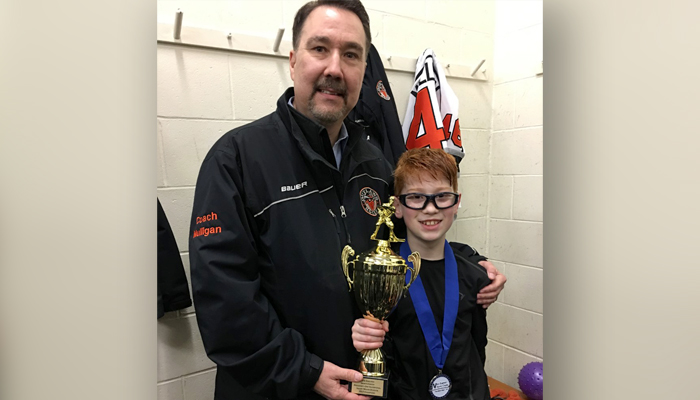Surgery Restores Heart of Patient with Hypertrophic Cardiomyopathy
BIDMC Contributor
FEBRUARY 20, 2023

Derek Mulligan has always been active. Whether playing hockey, taking part in competitive weekly golf games, or hiking with his family, Mulligan says he likes to keep moving.
But over the years, the 56-year-old father of four found that any activity would leave him fatigued, sometimes dizzy and short of breath. He gave up hockey and adjusted his fitness routines, using a cart during his golf games. “I became accepting of my physical limitations,” Mulligan stated. “I just thought I was getting older and slowing down.”
However, aging wasn’t the problem. In October 2021, Mulligan was diagnosed with a genetic condition known as hypertrophic cardiomyopathy (HCM). Today, Mulligan is recovering from surgery and says he is experiencing the most energy he has had in 20 years thanks to the support of BIDMC’s Hypertrophic Cardiomyopathy Clinic, the expertise of HCM Surgical Director Hassan Rastegar, MD, and the guidance of Usman Tahir, MD, Medical Co-Director of the HCM Clinic.
“I didn’t realize how good I could feel because I didn’t realize how bad I had been feeling,” Mulligan said. “It’s as if my car had been gradually losing five percent of its horsepower every year for 20 years — I might not notice that it didn’t have the power it once did.” Just two days after undergoing HCM surgery, Mulligan was up and walking through the corridors of BIDMC’s cardiac intensive care unit.
A Genetic Condition
An observation from his longtime cardiologist following an annual check-up first brought Mulligan to the Hypertrophic Cardiomyopathy Clinic. The multidisciplinary program is led by Drs. Rastegar and Tahir, and HCM Clinic Medical Co-Director A. Reshad Garan, MD. The Clinic includes a team of experts who work together to diagnose HCM based on a patient’s personalized medical history, physical exams, and a range of tests. This also includes an echocardiogram to measure the heart’s size, thickness, and ability to pump blood.
Mulligan had never heard of HCM prior to his diagnosis. In meeting with Tahir, who is also the Director of the Center for Cardiovascular Genetics, he learned that the genetic condition develops gradually and affects an estimated one in 500 individuals throughout the United States.
“HCM often runs in families and is caused by a change [“mutation”] in one copy of a heart gene that leads to a thickening of the heart muscle,” Tahir explained. In some cases, the heart’s thickened wall can limit blood from being pumped throughout the body and eventually lead to heart failure. When this happens, symptoms such as fatigue, dizziness and shortness of breath can develop. Treatment depends on the severity of the condition, which can include medication, implantable devices or septal myectomy surgery.
Septal Myectomy
Mulligan’s condition was severe enough to make him a candidate for surgery (septal myectomy), the “gold standard” of HCM treatment. He was introduced to Rastegar, an internationally known expert in the procedure, which focuses on surgically removing excess heart muscle to restore blood flow to the body. “Mr. Mulligan was an excellent candidate for this surgery,” said Rastegar.
“Dr. Rastegar’s surgical experience with treating HCM is among the most extensive in the field,” said Kamal Khabbaz, MD, BIDMC Chief of Cardiac Surgery. “He has performed more than 1,000 septal myectomies throughout his career with outstanding outcomes.”
Mulligan recalls how exceptionally open accessible Drs. Rastegar and Tahir were throughout his diagnosis and discussion of treatment options. “From the beginning, they made me feel like a friend, not just a medical chart.”
The staff at BIDMC made sure that Mulligan and his family knew what to expect from the surgery and the recovery, he said, so that when the operation was performed in October 2022, they were well prepared. “I can’t say enough about the nursing staff and everyone who took care of me,” said Mulligan. “I’m so thankful, this was such a great experience.”
Since HCM is a genetic condition, Mulligan’s four children have undergone echocardiograms to determine if they are showing signs of the disease. “They were not, and I’m thankful for that,” he said, adding that his family will continue to undergo testing every three to five years to monitor their heart health. They’re also busy making plans to take advantage of their dad’s newfound energy — now that his HCM has been fully treated and his heart safely repaired.
“It was a big operation, but now I feel like a million dollars — on my way to ten million,” said Mulligan.
Learn more about the HCM Clinic here. To schedule an appointment, call 844-225-9959 or email us.
